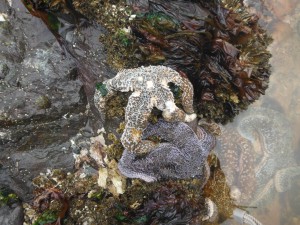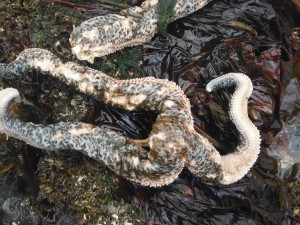Researchers from NCCOS and the University of Alaska Fairbanks School of Fisheries and Ocean Sciences found evidence of sea star wasting disease in Alaska while surveying intertidal areas near NOAA’s Kasitsna Bay Laboratory. The team found the diseased sea stars during long-term monitoring surveys conducted under the Gulf Watch Alaska program at sites around Elephant Island in the newly designated Kachemak Bay Habitat Focus Area. Damage ranged fromdermal lesions to near completedecay. Most of the sea stars wereofthe locally common genus Evasterias.


Sea star wasting disease, thought to be caused by a virus, is killing sea stars along much of the North American Pacific coast. Similar die-offs occurred in the region in the past, but not at this magnitude, nor in Alaska. Many scientists had thought that Alaskan waters were too cold for the virus, but recent warm ocean temperatures might be a contributing factor. Loss of sea stars is concerning because they are top predators that facilitate diverse ecosystems by consuming and thus preventing organisms, such as mussels, from taking over. Changes in their populations could have a ripple effect throughout the entire ecosystem, altering species distributions and ecological function.
For more information, contact Kris.Holderied@noaa.gov or Brenda Konar ( bhkonar@alaska.edu ).
